November 2020
|
| |
|
Kierkegaard’s Jesus
Soren Kierkegaard (1813–1855) is famous for arguing that
Jesus is the “absolute paradox” because he is fully
human and fully divine at the same time. We can’t figure
that out because by definition the divine and the human
can’t go together
– being too much different from each other, one being
corporeal and the other not, one omnipresent and the
other not, and so on. This could send you running out of
the room. But for Kierkegaard it creates the “happy
passion” of faith that draws you to Jesus – to look to
him and his baffling glory (Hebrews 12:2) (Kierkegaard’s
Writings
7:37, 54).
But Jesus is more than a conundrum for
Kierkegaard. He is also the Crucified One who is
punished in our place to save us from our sinful selves
when we believe in him (KW
17:280, 18:123). Let us keep that in mind when we
commemorate Kierkegaard in our parish on November 15 –
giving thanks to God for Kierkegaard’s witness to what
matters most about Jesus.
—Pastor
Marshall
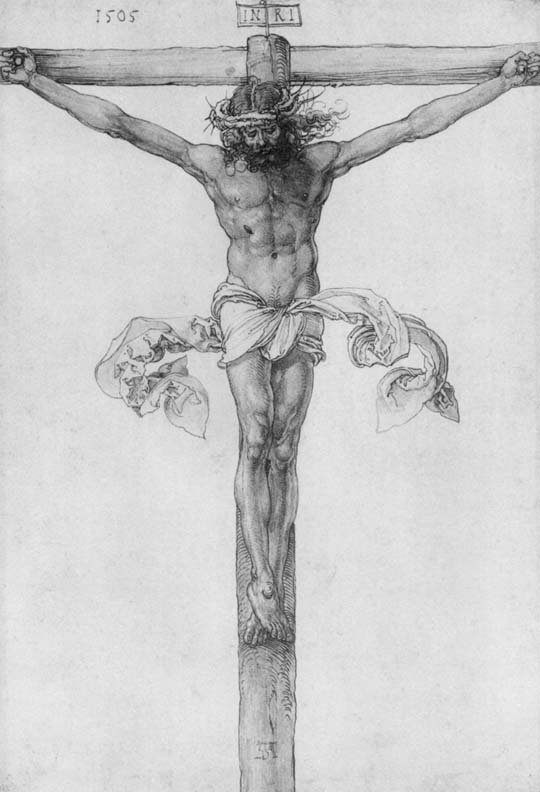
|
|
| |
|
PRESIDENT'S REPORT...by
Cary Natiello
Winter is almost here.
Yet with the change of seasons, not much has
changed for us.
We continue to suspend in-person worship services
and experts are concerned that there may be an even
bigger wave of COVID-19 infections to come.
They are concerned because people will be inside
together more because it is getting cold and rainy
outside.
This is flu season.
Then we have the holidays arriving soon and
family gatherings.
It isn’t hard to see why the experts are
concerned and don’t want us to let our guard down.
So what will we do?
Well, the
church council is
in the process of developing a detailed safety plan for
resuming indoor worship services with the goal of
protecting the health and wellbeing of our staff and
congregation.
We will be monitoring the few other churches in
our area that have started resuming in-person services
to see how things progress and if their safety
precautions are effective.
We will continue to keep you updated on the
status of our church resuming indoor worship services
and how we are doing with meeting our 5 criteria for
resuming indoor services.
The council will continue to meet virtually on a
regular basis and will monitor any changes that occur
with regard to the spread of the virus, any vaccines,
and any new governmental directives.
For now, these seem to be the most appropriate
next steps for our congregation and staff.
In the meantime, Pastor Marshall continues to
provide us with his abbreviated online liturgies,
conducting Bible study, his Koran Class, and book
discussions, and delivery of communion to our homes.
Thank you to Pastor Marshall.
And thank you to our congregation for your
continued financial support of our church.
Year-to-date, through September, our envelope
giving was $193,000 against a budget of $176,000.
It’s tough times like these when you can really
admire our congregation’s continued dedication and
support of our church.
Thanks be to God for all the wonderful things we
have even in these challenging times.
I very much appreciated reading the bulletin
cover for the October 11 online liturgy.
| I would not give
a single one of… whatever small [works] I have
ever done or will do – in exchange for all the
goods of the world. In fact, I hold one of these
to be of more worth than my bodily life…. For if
it is a good work, then God has done it through
and in me. If God has done it and it is God’s
work, what is the whole world in comparison with
God and His work? Even though I do not become
righteous through such work (for this must
already have happened through Christ’s blood and
grace, without works), it has still been done to
the praise and honor of God, for the help and
well-being of my neighbor. (Luther’s Works
59:270–71.) |
I believe that our continued support of our
church during these difficult times is our “good work.”
And, our church has even been able to give some much
needed financial support to a few of our extended
ministries.
Thanks be to God.
I pray that God’s peace and love continues to
shine upon us through Jesus Christ our Lord.
Amen
|
|
| |
|
A Special COVID-19 Report
– by Cary Natiello
At the last council meeting (10/13), we discussed our
five criteria for resuming in-person worship services.
The consensus of the council was that we cannot
meet criteria #3, which states, “Newly
diagnosed COVID-19 cases during the prior two weeks in
King County are minimal and declining.”
Unfortunately, as you are probably aware, King
County has experienced an uptick in cases (as of the
time of writing this report).
The good news is that it seems Seattle is doing a
better job overall compared to other large U.S. cities
around the country at keeping new COVID-19 cases low.
See the graph below which shows Seattle has the
lowest number of cases per 1,000 people.
When a vaccine is ready it may not be the perfect
solution.
What if over time there are many different vaccines
developed by these companies that are ultimately
authorized and licensed?
Which one will you choose?
Will you even be able to choose?
Will some vaccines be better for at-risk people
vs. others?
Do you trust that you will know the answer about which
one will be better for you?
What if a new one comes out that is supposed to
be better after you already took a previous vaccine?
Imagine what type of chaos this might create.
Not to mention that there are a reported large
number of Americans who do not plan on taking a vaccine
even if it is approved by the FDA.
So, we need to be prepared for a future that may
be very different from our traditional worship service
for a very long time.
When we do resume worship services, we want to
have a detailed safety plan in place so that we can
safely and responsibly resume worship services.
The church
council has formed a COVID-19 subcommittee to develop a
detailed safety plan for resuming our indoor worship
services.
If you have thoughts or opinions about our resuming
worship services please feel free to pass your ideas or
comments to me.
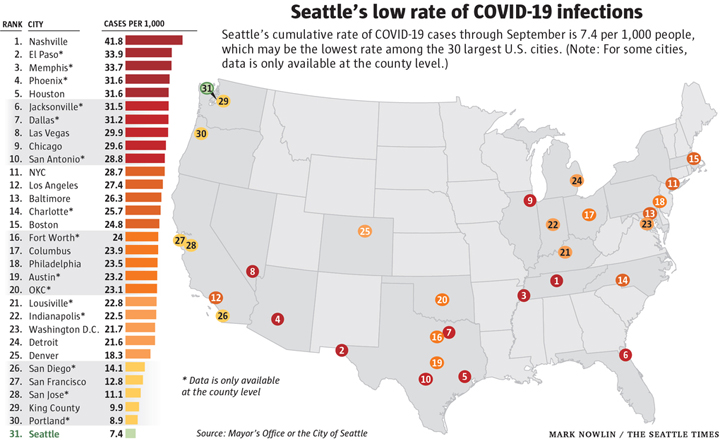
|
|
| |
|
Saint Nicholas Faire
and Auction
Friday, November 27th, from 6 pm to 9 pm
This year because of the Pandemic unfortunately we will
not be able to get together to gather for the
Saint Nicholas
Faire and Auction in the fellowship hall because
the church is closed.
We had to make a choice, not do the faire or do
it in a different way.
Instead of the traditional Saint Nicholas Faire
we will be doing a virtual auction.
In previous years we have used a Christmas tree
with ornaments in the lobby for you to choose and donate
items.
Since the church has been closed this won’t work.
This year we are using an Amazon Wish List for
items for you to select to donate.
The Amazon Wish List address link has been
e-mailed to you.
Just go to the list and select an item you would
like to donate.
Ship the items to:
Saint Nicholas Faire c/o King
8452 Tillicum RD SW
Seattle 98136-2417
You might need the King’s phone number: 206-937-6740.
Then send us an
e-mail telling us what you purchased.
That’s it.
That is how this year’s donations work.
We will have Silent Auction items to bid on –
kids items, cooking items, and gift cards,
Just to highlight a few items.
During the Pandemic, this is an excellent
opportunity to purchase some gifts without having to
leave your home.
This year you will log into the virtual auction,
you sign up and will be given a BID NUMBER to use on the
Silent Auction items.
This can be used for the silent bidding, making a
donation, and raffle tickets.
It takes a lot of people to make the Saint
Nicholas Faire a success.
Your willingness to support this is very much
appreciated.
Remember,
this is a fund raiser for the
West Seattle
Food Bank.
All the proceeds and cash donations are given
directly to this deserving extended ministry.
But it will not be a success unless
you sign up to
bid, bid on items, and have a good time!
We look forward to seeing you (virtually)
Friday, November 27th, from 6 pm to 9 pm
-Scott & Valerie Schorn
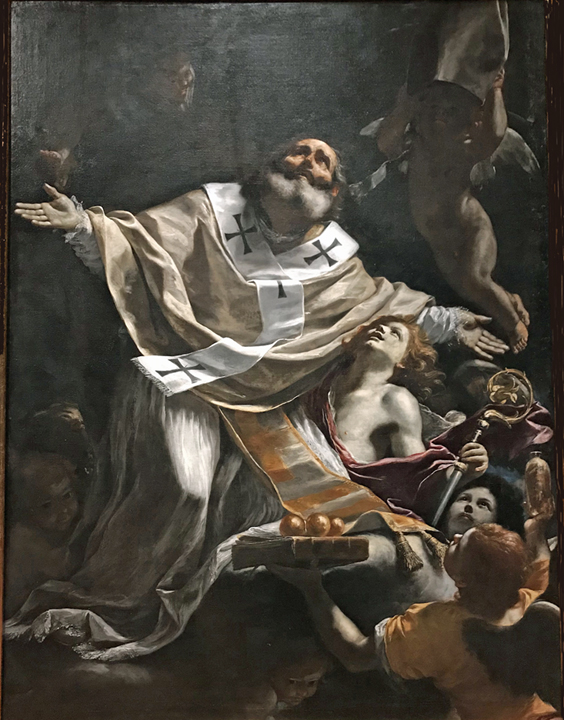
|
|
Announcements:
Sunday Worship
― online at www.flcws.org.
Pastor Marshall continues to offer these abbreviated
online liturgies weekly. In them we are spending our
time apart to accentuate Psalm 46:10 about being silent
before God.
THE KORAN CLASS:
Mondays at 7 pm, via ZOOM online.
FOOD BANK
donations for the holidays
will be
collected through these holiday months.
Also, new warm clothing items will be collected
for
Compass Housing
Alliance Christmas gift program for their housing
centers for both men and women. The Compass items need
to be delivered before Friday, December 11th.
Call the church office (206-935-6530) to make
arrangements to drop off any of these items.
FREE DONATIONS?
Sign up for the
Bartell Drugs
loyalty card program and designate First Lutheran Church
of West Seattle.
4% of your purchases will be automatically
donated to the church.
Also Amazon.com has a similar program called
Amazon Smile
that one can sign up for.
Wednesday Evening Bible Class:
Thursday
evenings, 7:00-9:00 pm, via ZOOM online.
If you are interested in joining this class email
Pastor Marshall at deogloria@foxinternet.com and he will
send you a link.
PLEDGE CARDS:
Please plan to return your pledge card before
Friday, November 6th.
|
|
| |
|

Philippians
The Apostle Saint Paul
“Work out your own salvation
in fear and trembling.”
(2:12)
by Pastor Marshall
Because Christians have troubles in
this life, Martin Luther thought we needed this verse.
So “you need to be alert,” he writes, “since you have
the flesh around your neck, which otherwise contends
against the spirit [Galatians 5:17], and you have the
devil as your enemy [1 Peter 5:8], and dangers and
distress around you [John 16:33] – so that you do not
again lose what you have received [Hebrews 2:1]. You
have only begun,” he continues, “and have not yet
reached the end [2 Timothy 4:7]. This is why you must
take care, struggle and be alert” (Luther’s
Works 78:318). Because this is so important, Luther
thought that “the most pestilent class of preachers
today is that group which preaches about the signs of
present grace, so that it makes men secure, when in fact
the very best sign of grace is that we fear and tremble
[Jeremiah 28:8], and the surest sign of God’s wrath is
to be smug and self-confident” (LW
25:498). That’s because “no man can be assured of his
salvation by any episcopal function. He is not even
assured of his salvation by the infusion of God’s
grace…. Even ‘the just will hardly be saved’ [1 Peter
4:18]. Finally the way that leads to life is narrow
[Matthew 7:14] that the Lord… calls those that will be
saved ‘a brand plucked out of the fire” [Amos 4:11]. And
everywhere else the Lord proclaims the difficulty of
salvation” (LW
48:46–47). “In such times we can rightfully bestir…
ourselves with God’s help [so] that we can be bold,
alert, and cheerful, committing our cause to God’s
gracious and fatherly will” (LW
43:171). For to work out our salvation in fear means “to
have God in view, to know that He looks at all our
works, and to acknowledge Him as the Author of all
things, both good and evil” (LW
15:55).
This fear is
needed because “the war is so fierce, the impediments so
great.” So keep God in view. “When you’re eating,
consider God present…. When you’re going to sleep, when
you’re angry, when you’re taking what’s not yours, even
when you’re indulging in luxury, whatever you’re doing,
never fall into laughter, never kindle your anger. If
you continually have this attitude, you’ll continually
be in fear and trembling, the reason being that you’re
standing next to the king.” God helps us with this by
giving us “both readiness and practice” (John
Chrysostom,
Homilies on Philippians, trans. P. Allen, 2013, pp.
171, 173). Nevertheless, with God’s help and by his
grace, we still are to struggle to be with God in order
“to show and prove oneself, what one is as a Christian.”
For in the act of conversion, we’re never thought of
here “as stock or stone” (Karl Barth,
Epistle to the
Philippians: 40th Anniversary Edition, trans. James
W. Leitch, 2002, p. 72).
Some think
this salvation is not about a “relationship with God,
but what salvation means for life with one another”
(John Reumann,
Philippians, 2008, p.409). But others see that “no
doctrine of grace protects us… from work…. The church is
to actualize in concrete ways…. Is there not the danger
of work slipping… into [works] righteousness? That
danger has apparently driven some members and clergy
straight to the hammock as the only place where a
doctrine of grace can be kept safe. [That] danger,
however, is not a real one at all” (Fred Craddock,
Philippians,
1985, p. 46). That’s because it’s only “a matter of
receiving anew what has already been given” by God.
Indeed, “we are acted upon so that we may act, not so
that we may do nothing” (George Hunsinger,
Philippians,
2020, pp. 74, 76). Even so, Christians are not expected
to earn their own salvation, but only to live “into all
it means and expects of them,” in awe-inspired lives of
obedience, which makes them “different from [the]
crooked and distorted culture” around them (Bonnie B.
Thurston,
Philippians, 2009, pp. 94, 98).
|
|
| |
|
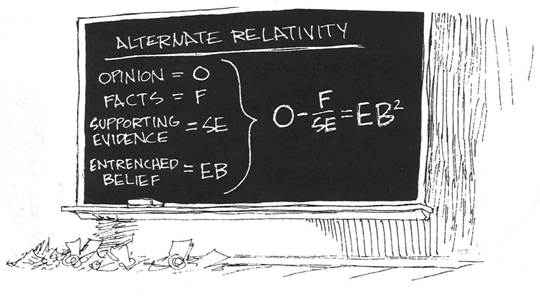
Christians should hold the Bible in one hand and the
newspaper in the other (Ronald F. Marshall, “Christ as a
Sign of Contradiction,”
Pro Ecclesia,
Fall 1997, p. 481n.10). This combination makes
Christians “learned” (Ronald F. Marshall, “In Between
Ayer and Adler: God in Contemporary Philosophy,”
Word & World,
Winter 1982, p. 69). For just as the Bible explains sin
and salvation, it is the newspapers (along with other
secular analysts) that describe our setting. So God has
no specific word for us on how best to understand
America today (1 Corinthians 7:25). But here are four
key points about the USA in 2020 that I have garnered
from those secular studies.
DISUNITY.
Our country has never been united. Even in the
Revolutionary War (1775–1783) we weren’t united against
England. Note that 75% of the battles fought in that war
were between Americans. No British soldiers were
involved (Thomas B. Allen,
Tories: Fighting
for the King in America’s First Civil War, 2010, pp.
xix, 299, 333). No, that war was fought between American
colonialists loyal to the British crown and those who
weren’t. The same happened thirty years later in the War
of 1812 (Alan Taylor,
The Civil War of
1812: American Citizens, British Subjects, Irish Rebels,
& Indian Allies, 2010, pp. 12, 140, 163). And then
in the great Civil War of 1861–1865 it happened again
with greater destruction than ever before or ever since
(James McPherson,
Battle Cry of Freedom: The Civil War Era, 1988, pp.
viii, 267, 272, 854). This time Americans fought each
other over freedom – whether it freed you from old
restraints (what the rich wanted) or for new
achievements (what the poor wanted) (James McPherson,
The War That
Forged a Nation: Why the Civil War Still Matters,
2015, pp. 12–13). That war is still with us – and so our
saddest words are
was and again
(Michael Gorra,
The Saddest Words: William Faulkner’s Civil War,
2020, pp. 10, 337, 355–56). Bob Dylan agrees – arguing
that the Civil War world is “the same one” we have. It’s
“a culture of feeling, of black days, of schism, evil
for evil, the common destiny of the human being getting
thrown off course. It’s all one long funeral song,” he
said, and his music is no different (Bob Dylan,
Chronicles,
Volume One, 2004, pp. 85, 86, 89).
REASON.
Our country has never been controlled by reason.
Believing that the truth comes from thinking through the
best information available has never marked all sectors
of American life. From the beginning our goal has been
to show “how much could be done without literature and
learning” (Richard Hofstader,
Anti-Intellectualism in American Life, 1962, p. 51).
Some say our emotions serve us best (Dayton Duncan & Ken
Burns, Country
Music: An Illustrated History, 2019, p. 465). Others
say our opinions should stand as they are – forgoing the
“challenges [needed] to learn, adapt, and grow” (Greg
Lukianoff & Jonathan Haidt,
The Coddling of
the American Mind: How Good Intention and Bad Ideas are
Setting Up a Generation for Failure, 2018, p. 51).
This has made open debate among us rare – and so we
don’t understand one another very well when we disagree
(Allan Bloom, The
Closing of the American Mind, The 25th Anniversary
Edition, 2012, and Robert Ringer,
Winning Through
Intimidation, 1973, 2013).
POWER.
Social Darwinianism indelibly marks America – the belief
that only the strongest deserve to succeed (Jim
MacLaughlin,
Kropotkin and the Anarchist Intellectual Tradition,
2016). This makes all social welfare unpopular. It also
makes the unequal distribution of wealth the standard.
Furthermore it makes the disadvantaged “withdraw” from
trying to succeed, because they think they’re “too
stupid or poor to make it” (J. D. Vance,
Hillbilly Elegy:
A Memoir of a Family and Culture in Crisis, 2018,
pp. 255, 56).
INTOXICATION.
Most Americans are – to some degree – drunk much of the
time. Mind-altering substances are a big business –
legally and illegally (James Mills,
The Underground
Empire: Where Crime and Governments Embrace, 1986).
Mind-altering substances have saturated our country from
the days of those raucous saloons (Jeremy Agnew,
Alcohol and Opium
in the Old West: Use, Abuse and Influence, 2013).
Even our period of prohibition (1920–1933) wasn’t over
drunkenness, but rather due to left over disdain for
Germans from WWI (1914–1918) who owned 70-80% of
American breweries (D. Okrent,
Last Call: The
Rise and Fall of Prohibition, 2011, p. 30). Some
argue that this is a natural human pleasure – as seen in
children whirling around to make themselves dizzy
(Andrew Weil, The
Natural Mind: A Revolutionary Approach to the Drug
Problem, 1972, 2004, p. 25). But many more see it as
coming from a deep unhappiness in America (Nick Reding,
Methland: The
Death and Life of an American Small Town, 2010, p.
78, and Susan Cheever,
Drinking in
America: Our Secret History, 2015).
USA 2020: A Personal Primer
by Pastor Marshall
Seattle, Washington, October 2020
|
|
| |
|
Onward Christian Soldiers
The 19th century English hymn, “Onward Christian
Soldiers” was one of my most favorite hymns growing up.
It still is one of my favorites. I especially love the
message in the lyrics:
“Onward Christian soldiers, marching as to war,
with the cross of Jesus going on before.
Christ the royal master, leads against the foe;
forward into battle, see his banners go!” (LBW 509, 1st
verse)
Life has really changed dramatically in the last
nine months of this year, 2020. There has been so much
uncertainty in so many areas of our lives.
Areas of our lives that we felt were rock solid,
a given, never to change. Now every time we turn around,
there is something new and challenging!
So even though our life is a little rocky right
now, we are still required to be responsible stewards of
our commitments which would include time, talents and
money. The St. Nicholas Faire is coming up at the end of
the month so be sure to participate in the virtual
auction to raise money to support the West Seattle Food
Bank and Helpline.
Keep trusting in the Lord and no matter what
happens turn to Christ and keep marching with the cross
of Jesus going on before... “one in hope and doctrine,
one in charity,” (2nd verse, 1st stanza).
Holly Petersen, Church
Council
|
|
| |
|

ALL
SAINTS:
Parish Festival
Sunday, November
1st
X
X
X
CHRIST THE KING:
The season of Pentecost and
the
Church Year will end with the celebration of the
Kingship
of Christ at the Sunday morning liturgies,
November
22nd.
On this day we strengthen the belief that Christ
is above all and that every authority is under Him (Eph.
1.21). We
rejoice that the
One
who is, who was and is to come (Rev. 1:8) is the King
and Lord of all!

ADVENT I
Sunday, November 29th

|
|
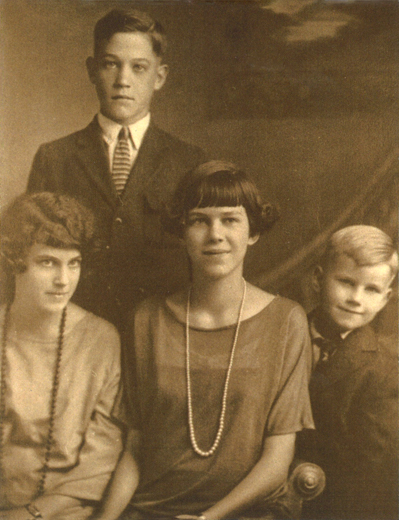
The Gunderson family were Charter members.
This photo, from 1924, is new to our archives and
courtesy of
Mary Beth Anderson, Edith’s daughter-in-law.
From left to right:
Gudron (1907-1986), Glen (1910-1984), Edith (1909-1990),
Ralph (1918-2001).
|
|
| |
|
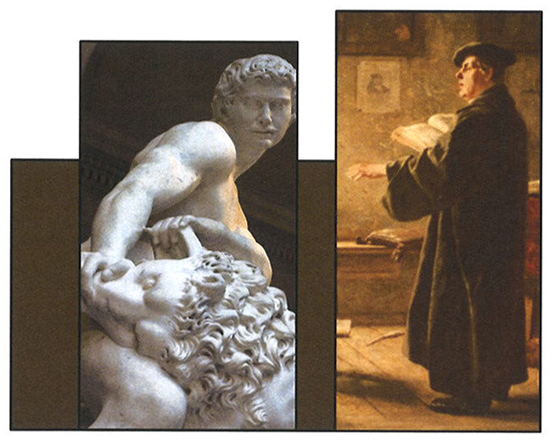
Luther on Samson
By Pastor Marshall
In
1534 Martin Luther wrote that when Samson famously
crushes his many enemies at the end of his life by
pushing over “the two middle pillars upon which the
house rested” (Judges 16:29), Daniel 11:37 was also in
play. That verse refers to twin abominations – idols
(gods of the fathers as the sacrificial mass) and
celibacy (the one beloved by a woman) (Luther’s
Works
38:232). Luther then takes that connection and extends
it to himself. “These are the two pillars,” he goes on
to say, “on which the papacy rests, like the house of
the Philistines in Samson’s time. Now what if God had
made Luther a Samson over them, a Samson who would take
hold of and tear down both pillars so that the house
would collapse and they would all perish? Who could hold
this against him?” (LW
38:233). Some would, seeing both living “misspent”
lives. Most, however, would agree in part, seeing in
these two “a free spirit, a rebel driven by selfish
interests, doing whatever he pleases without any respect
for his parents and with no respect for the claims of
God on his life, but in the process he ends up doing the
will of God” (Trent Butler,
Judges, 2009,
p. 354).
|
|
| |
|
Romans 14:17
Monthly Home Bible Study,
November 2020, Number
333
The Reverend Ronald F. Marshall
Along with our other regular study of Scripture, let us
join as a congregation in this home study. We will
study alone
then talk informally about the assigned verses together
as we have opportunity. In this way we can “gather
together
around the Word” even though physically we will not be
getting together (Acts 13.44). (This study uses the RSV
translation.)
We need to support each other in this difficult
project. In 1851 Kierkegaard wrote that the Bible is “an
extremely dangerous book.... [because] it is an
imperious book... – it takes the whole man and may
suddenly and radically change... life on a prodigious
scale” (For
Self-Examination). And in 1967 Thomas Merton wrote
that “we all instinctively know that it is dangerous to
become involved in the Bible” (Opening
the Bible). Indeed this word “kills” us (Hosea 6.5)
because we are “a rebellious people” (Isaiah 30.9)! As
Lutherans, however, we are still to “abide in the womb
of the Word” (Luther's
Works 17.93) by constantly “ruminating on the Word”
(LW 30.219)
so that we may “become like the Word” (LW
29.155) by thinking “in the way Scripture does” (LW
25.261). Before you study then, pray: “Blessed Lord, who
caused all Holy Scriptures to be written for our
learning: Grant us so to hear them, read, mark, learn
and inwardly digest them, that we may embrace and ever
hold fast the blessed hope of everlasting life, which
you have given us in Our Savior Jesus Christ. Amen”
(quoted in R. F. Marshall,
Making A New
World: How Lutherans Read the Bible, 2003, p. 12).
And don’t give up, for as Luther said, we “have in
Scripture enough to study for all eternity” (LW
75:422)!
Week I.
Read Romans 14.17
noting the line
the kingdom of God is… righteousness and peace and joy
in the Holy Spirit. What is this righteousness? On
this read John 16.10 noting the line
because I go to
the Father, and you will see me no more. What does
this have to do with righteousness? On this note how
Christ is our
righteousness in 1 Corinthians 1.30. What does that?
Read Ephesians 5.2 about the
fragrant offering
that Jesus made of
himself… to God.
And how does that sacrifice make us righteous? On this
read Revelation 7.14 noting how believers are
washed white
by the blood of
the Lamb. What is that washing? Read Titus 3.5–7
noting the words
mercy,
washing,
regeneration,
justified and
heirs. How are we made heirs? Read Colossians 1.13
noting the words
delivered and
transferred. Who does this? Read Philippians 3.12
noting the line that
Christ Jesus has
made me his own. Is there anything for us to do?
Yes, in that same verse we are told to make Christ our
own after he has made us his own. How do we do that?
Note the famous line
work out your own
salvation with
fear and
trembling in Philippians 2.12. That struggle brings
righteousness
and faith
together as in Romans 3.22.
Week II.
Read again Romans
14.17 noting the same line
the kingdom of God is… righteousness and peace and joy
in the Holy Spirit. And what is this peace? On this
read Romans 12.18 noting the line
live peaceably
with all. How can we live that way? Note
mutual upbuilding
in Romans 14.19. What’s that like? Check out the two
uses of interest
in Philippians 2.4. How can we combine these? Note the
connection between
grace and
humility in
James 4.6. How do we then pursue humility? Read 1 Peter
5.6–10 noting the operative words
under,
mighty,
cast,
anxieties,
sober,
resist,
firm,
world,
suffered and
restore.
These ten words work together to make us humble – which
we can’t accomplish on our own.
Week III.
Reread Romans
14.17 noting again that line
the kingdom of God is… righteousness and peace and joy
in the Holy Spirit. Finally, what is this joy? Read
Philippians 4.4 noting the line
rejoice in the
Lord. How does this joy take hold when there is so
much sadness, failure and sorrow? On this read 2
Corinthians 6.10 noting the line
as sorrowful, yet
always rejoicing. But how do these go together? Read
1 John 3.19–20 noting the
assurance
that comes even when we
condemn
ourselves because God is
greater than our
hearts. What makes God greater than our sorrow now?
Check out 2 Corinthians 4.16–18 noting
the eternal
weight of glory that offsets everything that is
transient or
temporal, seen,
and wasting away.
What does this greatness do for us? Read John 14.1–3
noting how having a
place
prepared in
heaven with Christ enables us not to have
troubled hearts.
But can’t the sadness now also be ended? Read John 16.33
noting that
tribulation now is unavoidable – but
cheer also
abides because what is now here will eventually go away.
Read also about this in 1 Corinthians 7.31 –
the present form
of this world is passing away. 2 Peter 3.10 says it
will be burned up.
Do you find comfort in that? Why should you?
Week IV.
Read Romans 14.17
one last time noting the same line
the kingdom of
God is… righteousness and peace and joy in the Holy
Spirit. Many of the parables also talk about the
kingdom of God. Which one is most like this verse? Read
Matthew 13.45–46 noting the
pearl of
great value
and then the selling of
all in order
to get it. What shall we make of this pearl? Read
Ephesians 1.8 and the word
lavished.
Note also the phrase
surpassing worth
in Philippians 3.8. These two verses about excess
inspire us to sell all that we have in order to get that
pearl. It enables us to work out our salvation
with fear and
trembling in Philippians 2.12. How can we put up
with this trouble? On this read Romans 8.18 noting how
our present
suffering is devalued by the coming
glory. Do you
agree?
|
|
| |
|
 PARISH PRAYERS
PARISH PRAYERS

Remember in prayer before God those whom He has made
your
brothers and sisters through baptism.
Leah Baker, Dorothy Ryder, Melanie Johnson, Sam & Nancy
Lawson, Marlis Ormiston, Connor Bisticas, Eileen & Dave
Nestoss, Kyra Stromberg, Diana Walker, Tabitha Anderson,
The Rev. Albin Fogelquist, The Rev. Howard Fosser,
The Rev. Kari Reiten, The Rev. Dave Monson, The
Rev. Dan Peterson, The Rev Alan Gardner, Eric Baxter,
Sheila Feichtner, Yuriko Nishimura, Leslie Hicks, Mary
Lou & Paul Jensen, Lesa Christensen, Maggie & Glenn
Willis, Evelyn, Emily & Gordon Wilhelm, Karen Berg,
Bjorg Hestevold, Garrison Radcliffe, Antonio Ortez,
Angel Lynn, Garrett Metzler,
Marv Morris, Noel
Curtis, Randy Vater, Doreen Phillips, Richard Patishnock,
Jeff Hancock, Yao Chu Chang, Marie Magenta, Will
Forrester, Wayne & Chris Korsmo, Holly & Terrance Finan,
Terry Fretheim, Heather Tutuska, Josie West, Anthony
Brisbane, Lori Aarstad, Ty Wick, Dan Murphy, Pete
Forsyth, Randy Lonborg.
Pray for our professional Health
Care Providers:
Gina Allen, Janine Douglass, David Juhl,
Dana Kahn, Dean Riskedahl, Jane Collins
and
all those suffering from the coronavirus pandemic.
Pray for the United States during this
presidential election year, and for unbelievers, the
addicted, the sexually abused and harassed, the
homeless, the hungry and the unemployed.
Pray for the shut-ins that the light of Christ
may give them joy:
Gregg & Jeannine Lingle, Bob & Mona Ayer, Joan
Olson, Bob Schorn, Doris Prescott, C.J. Christian,
Dorothy Ryder, Crystal Tudor, Nora Vanhala, Martin
Nygaard, Anelma Meeks.
Pray for our bishops Elizabeth Eaton and Shelly
Bryan Wee, our pastor Ronald Marshall, our choirmaster
Dean Hard and our cantor Andrew King, that they may be
strengthened in faith, love and the holy office to which
they have been called.
Pray that God would give us hearts which find joy
in service and in celebration of Stewardship.
Pray that God would work within you to become a
good steward of your time, your talents and finances.
Pray to strengthen the Stewardship of our
congregation in these same ways.
Pray for the hungry, ignored, abused, and
homeless this November.
Pray for the mercy of God for these people, and
for all in Christ's church to see and help those who are
in distress.
Pray for our sister congregation:
El Camino de Emmaus in the Skagit Valley that God
may bless and strengthen their ministry.
Also, pray for our parish and it's ministry.
Pray that God will bless you through the lives of
the saints:
Saint Andrew, the Apostle.
|
|
A Treasury of Prayers
For my
deliverance from all affliction, wrath, danger, and
need, I pray to you, O Lord. Help, save, comfort, and
defend me, gracious Lord. In the name of Jesus I pray.
Amen.
[Lutheran
Book of Worship 1978, p. 151, altered]
|
|
| |
|